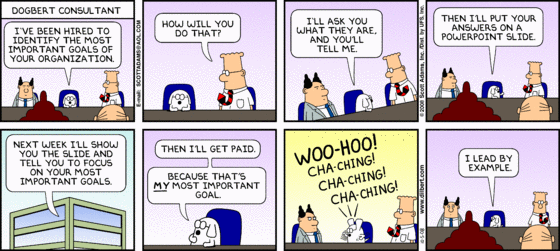Our Biggest Mistakes
Robby Slaughter
Since I just authored a book called Failure: The Secret to Success, it’s probably a good time to talk about things we do wrong at Slaughter Development. One mistake, in particular, we keep making because it’s so tremendously attractive.
Here’s what we continue to do, even though it’s a terrible idea: we often build initial client relationships with high-level executives and owners.
This probably sounds counter intuitive. If Slaughter Development is a business process consulting company, shouldn’t we want to meet the people who are in charge of all of the business processes?
After many years of experience, the answer is definitely not. If there are workflow and productivity challenges in an organization, we need to meet with the people on the front lines who personally experience these frustrations. We should get to know them to find out if they believe change is possible. We should connect with those who will be putting new processes into action so they have confidence in our ability to help.
However, there’s an even more critical reason why business process consultancies should avoid starting at the top. Companies that are experiencing some dysfunction will only be further aggravated if the boss brings in an outside expert. Think about it: how do you feel when someone shows up and tries to tell you what to do? Probably a lot like this strip from Dilbert:

Usually, business process consultants that start out by working with management end up being less effective overall, because doing so breeds distrust among stakeholders. After all, if company leaders want to increase productivity, why don’t they try talking to the people doing the work rather than some outside firm? In our business, reaching out to executives to begin a relationship is a bad move.
So why do we keep making this mistake? Because building connections with managers is devilishly attractive. They are used to interacting with outside vendors and know how to give tours and describe the company business model on a whiteboard. They have the authority to take you to lunch on an expense account or head out of the office for an afternoon training session. You know they can make the decision to hire your firm on the spot, and that power is intriguing. In short: it’s easy to sell to executives because they are accustomed to salespeople.
Furthermore, this is the advice of every sales training program everywhere. Virtually all sales coaches will tell you not to waste time with people who don’t have the authority to make use of whatever you are offering, and instead ask to be introduced to the people in charge. That makes sense when you are selling a product that doesn’t require total buy-in from stakeholders. Methodology Engineering, however, is entirely different. Because our approach to process improvement is stakeholder-centric and bottom-up, our sales approach should also be stakeholder-centric and bottom up. We need to reach out to the people who we want to help first, not the folks who will decide whether or not to sign the contract. That comes later, if and only if there is a match.
So, I’m resolved to do my best not to make this mistake. If you’re an executive, don’t be offended that I’d rather talk to the people who work for you. If you’re on the front lines, I really do want to get to know you. If we end up working together to help your company become more productive, you’re the best place to start.
❖ ❖ ❖
Like this post? Here are some related entries from The Methodology Blog you might enjoy:
